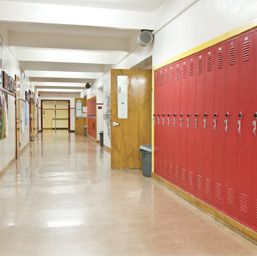
In many ways, enrolling junior high kids have become old pros at the fine art of academia. They’ve had plenty of time to master homework, friendships, and scholastic benchmarks. Yet, just as they’ve reached academic and social proficiency, they’re about to embark on a very turbulent transition period of lightning-fast physical, emotional, social, and intellectual growth. Although pre-adolescents don’t always show it with their words or actions, they need their parents’ love, involvement, and support every bit as much as they did in elementary school. Come Fall, they may face unique challenges that isolate them at a time when they need your increased reassurance. Here are just a few examples.
They need to fit in. Many beginning junior high students have specific worries about looking out of place. They worry about navigating a larger facility, having a locker, being on time for their next class, and juggling several different teachers. Add in changing hormones, the beginnings of peer pressure, and tweens’ tendency to view everything as a ‘crisis,’ and the result can be an enormous amount of anxiety.
You can help ease these fears by visiting the school prior to the first day of class and making sure that your child has walked their daily routine several times. Tape their schedule and locker combination inside of a folder (or input in the note’s section of their cell phone) just in case. Since self-esteem is directly tied to feelings of acceptance, pre-teens may covet the clothes, hairstyles, and hobbies embraced by their friends. Although it may be hard to accept, experts encourage parents to give kids some freedom with their appearance. Counsellor Bonnie Harris, who wrote, When Your Kids Push Your Buttons: And What You Can Do About It, suggests an open dialogue to address any concerns: “You have the right to say, ‘I’m not comfortable’ and explain why,” she explains. “But if you start out with, ‘You can’t go out looking like that,’ you can’t win.”
They have to quickly learn organization. A junior high student may get four to five assignments per day. This amounts to 20 to 25 per week or a whopping 150 to 180 assignments per marking period. Because keeping track of all of these assignments and their deadlines is such a challenge, teachers strongly advise that students have a separate, designated homework folder or agenda to record obligations. Review the homework folder daily and help your student decipher what teachers expect over the short- and long-term. You may need to help your child break down assignments into smaller chunks to avoid overload, especially at first. Determine a time estimate for each task so your child doesn’t inadvertently overcommit themself or procrastinate. This new workload can be an adjustment, so help your student set up a regular time and place where they can comfortably complete assignments without being disturbed by siblings, electronics, or other distractions.
They may face peer pressure. Experts say that parents should address peer pressure well before the first day of school by speaking freely about your values, sharing your own experiences, and helping your child find ways to respect your wishes but still fit in. Offer acceptable ways for them to escape risky situations. Role-play to find face-saving one-liners like, “I couldn’t go to the mall with you this weekend if my mom caught me skipping class.” Pick a code word or phrase to use when they need you to bail them out of an uncomfortable situation but can’t say so. For example, when they call you ‘mother’ instead of ‘mom,’ this means they need your help, but can’t explain why in front of their friends. Do everything in your power to arm your child with high self-esteem, respect for themelf and others, and strong moral standards. “When a person believes in herself, she is more likely to make the right decisions in difficult moments,” says Mike Domitrz, creator of Date Safe, an interactive program for schools. “Students with low self-esteem are more likely to lower their standards to please others - a very dangerous and unhealthy behavior.”
They still need your continued involvement. The start of junior high school has the potential to be a difficult adjustment, but it can also be an opportunity to strengthen your relationship with your tween. Try to see this transition as an opportunity to reinforce your family’s values and to remain as connected as you have always been. Cynthia Ulrich Tobias, co-author of Middle School: The Inside Story: What Kids Tell Us, But Don’t Tell You, assures parents that these years can actually be advantageous: “Instead of just barely hanging on and riding out these middle school years, this stretch of your lives together can be a time that enriches and deepens your relationship in ways you never thought possible.” Many experts stress that loving parental involvement is critical to how successfully preteens navigate these turbulent years. Most of the time, they actually want your continued and loving support - even if they insist otherwise.
Author Shannon is also a freelance writer who enjoys covering the health and well-being of families.
Calgary’s Child Magazine © 2024 Calgary’s Child